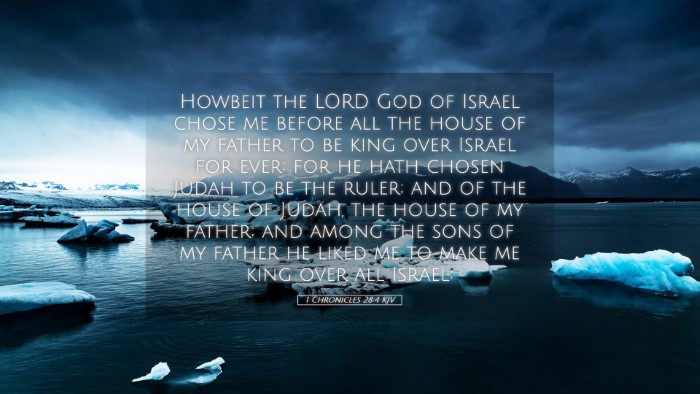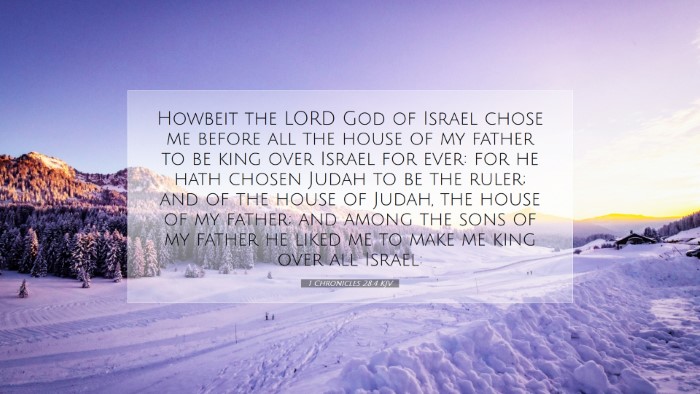Commentary on 1 Chronicles 28:4
Verse Reference: 1 Chronicles 28:4 - "Yet the LORD God of Israel chose me before all the house of my father to be king over Israel forever: for he hath chosen Judah to be the ruler; and of the house of Judah, the house of my father; and among the sons of my father he liked me to make me king over all Israel."
Introduction
This verse from 1 Chronicles serves as a poignant declaration of God's sovereignty and choice in leadership. It encapsulates the divine selection of David as king, emphasizing the significance of his lineage and God's purpose for Israel. The insights from various public domain commentaries provide a deeper understanding of the theological, historical, and practical implications of this text.
The Divine Selection of David
The declaration in this verse highlights that David did not attain kingship by mere human ambition or familial legacy. Rather, Matthew Henry emphasizes that it was the LORD God who selected David, reinforcing the concept that all authority and office are derived from divine appointment. This underscores a profound principle in biblical leadership: that God chooses those whom He wills for specific purposes.
Divine Sovereignty
Albert Barnes reflects on the sovereignty of God in this selection process. He argues that God's choice operates outside human standards and expectations. David, the youngest son of Jesse, was not the natural choice for a leader; however, God’s choice demonstrates His divine prerogative to appoint leaders based on His wisdom and purposes rather than human criteria.
Judah as the Chosen Tribe
The mention of Judah in David's declaration is rich with significance. Adam Clarke notes that Judah was the tribe from which the royal line would come, establishing a connection to the messianic lineage. This selection of Judah, and subsequently David, points to the fulfillment of God's covenant promise, indicating a future hope embodied in Christ, the Lion of the tribe of Judah. The choice of David also reflects a larger narrative of redemption woven throughout Scripture.
Understanding David’s Legacy
David acknowledges his unique position as chosen by God, highlighting the grace and favor he received. This acknowledgment invites deeper reflection on the biblical notion of legacy. Matthew Henry discusses David’s legacy, noting how God’s choice of him produced a lineage that not only ruled Israel but also impacted the entire trajectory of redemptive history.
Importance of Lineage
The significance of lineage in ancient Israel cannot be overstated. Albert Barnes points out that David's family line was crucial for establishing legitimacy in leadership, and thus God’s choice was not only about personal merit but also about fulfilling His promises to Abraham, Isaac, and Jacob. Each leader within Israel was seen as part of a divine narrative leading toward the ultimate king—Jesus Christ.
Application for Leaders Today
This verse and its commentary encourage present-day leaders to recognize their role as appointed by God. As Adam Clarke suggests, acknowledging God’s sovereignty in leadership can cultivate humility and reliance upon divine guidance. Effective leaders must understand that their authority originates from God, which should compel them to serve with integrity and purpose.
Servant Leadership
The example of David’s leadership serves as a model for contemporary leaders in the church and other spheres. Matthew Henry mentions the importance of leading with a heart for God and His people. David's life exemplifies the concept of servant leadership—a reminder that true leadership is not about power or control, but about serving others and fulfilling God’s plan.
Conclusion
1 Chronicles 28:4 presents a powerful testament to the themes of divine choice and leadership. Through the insights gathered from public domain commentaries, we see not only the historical context of David’s reign but also its theological implications for understanding God’s sovereignty, the messianic line, and the nature of godly leadership. For pastors, students, theologians, and bible scholars, this passage invites reflection on how God calls and equips leaders today to fulfill His purposes in the modern world.


